
March 2019
For Veterinary Medical Educators, All Roads Lead to Washington D.C. March 8-10, 2019
 The AAVMC’s annual 2019 AAVMC Annual Conference and Iverson Bell Symposium scheduled March 8-10, 2019 at the Hyatt Regency Washington on Capitol Hill in Washington, D.C. is shaping up to be the largest ever. Almost 325 people have already registered. With “walk-in” registrations, more than 350 leading educators are expected to attend, shattering records. Those guests will consider “The Science of Building Inclusive Teams” as they hear from dozens of respected experts, including keynoters author Scott Page, the NIH’s Kara Hall, and Inside Higher Ed’s Scott Jascik. For more information, click here.
The AAVMC’s annual 2019 AAVMC Annual Conference and Iverson Bell Symposium scheduled March 8-10, 2019 at the Hyatt Regency Washington on Capitol Hill in Washington, D.C. is shaping up to be the largest ever. Almost 325 people have already registered. With “walk-in” registrations, more than 350 leading educators are expected to attend, shattering records. Those guests will consider “The Science of Building Inclusive Teams” as they hear from dozens of respected experts, including keynoters author Scott Page, the NIH’s Kara Hall, and Inside Higher Ed’s Scott Jascik. For more information, click here.The Ominous Implications of Implicit Bias
 No matter how enlightened and fair-minded we may think we are, our thought processes have been shaped by a lifetime of experiences. Exposure or participation in incidents involving stereotypical or biased behavior decades ago affects the way we interact with others every day, and most of us are oblivious to it. Recognizing and correcting for implicit bias in the way we live our lives is an important first step toward creating truly diverse and inclusive environments, and there are a variety of ways to do it. Check out this fascinating Q&A on implicit bias with AAVMC Senior Executive Director for Institutional Research and Diversity Dr. Lisa Greenhill.
No matter how enlightened and fair-minded we may think we are, our thought processes have been shaped by a lifetime of experiences. Exposure or participation in incidents involving stereotypical or biased behavior decades ago affects the way we interact with others every day, and most of us are oblivious to it. Recognizing and correcting for implicit bias in the way we live our lives is an important first step toward creating truly diverse and inclusive environments, and there are a variety of ways to do it. Check out this fascinating Q&A on implicit bias with AAVMC Senior Executive Director for Institutional Research and Diversity Dr. Lisa Greenhill.What is it?
In a nutshell, implicit or unconscious bias is when attitudes and stereotypes about people or circumstances unwittingly shape our thoughts and behaviors.How does it come about?
Cognition takes up a lot of energy, and our brains are always seeking out the most efficient ways of processing the vast amounts of information we take in moment to moment. As a result, we do a lot of ‘automatic’ processing, which is based on what we have been exposed to and what we have learned. The problem is that when we are repeatedly exposed to information rooted in stereotypes and falsehoods, we convert that into learned information that is then used in our automatic processing.What are the implications and consequences?
The consequences of implicit bias can be numerous because of the various types of bias. We are more likely to select people for positions or opportunities that replicate ourselves (affinity bias). We are more likely to attribute the accomplishments of others to luck rather than hard work (attribution bias). We run the risk of committing confirmation bias when we selectively look for proof of our opinion or position in the behaviors of others. There is also the “halo and horns” effect that is similar to affinity and confirmation bias in that we overlook positive and negative individual attributes that are not in-line with our opinion.When was it recognized?
Early cognition research in the 1950s eventually led to the work of Dr. Mahzarin Banaji and many others in the 1990s. This is when the defined theories underpinning implicit bias really emerged and the field of study expanded.What can be done about it?
Informally and on an individual level, personal work around self-reflection and awareness can really help us see where we might stumble into relying on stereotypes and preconceived notions. Typically when we are confronted with information that “doesn’t fit” how we think it should, we try to find ways of discounting that information. It is in those moments of cognitive dissonance that we should spend more time reflecting upon why the new information is so unsettling and why we seek to discount it in decision-making.At a systems level, there has to be an organizational commitment to continuous training and policies and practices that expose and correct for our organizational vulnerabilities to implicit bias.
What is the AAVMC doing about it?
We encourage our member institutions to seek out training resources on their main campuses for selection and admissions committees. We also encourage routine training of faculty, students and staff; with students, we think it is critically important to tie this information to client engagement and health outcomes, since there is so much research in human health on the negative impacts of implicit bias in health care.As a part of our Holistic Review program, we provide admissions committees some basic exposure and training to how implicit bias potentially affects how applicants are selected for admission into veterinary school.
And with the Diversity and Inclusion on Air podcast, we have numerous episodes that explore how bias plays a role in our larger diversity and inclusion efforts in veterinary medicine.
Award Winners Featured on Diversity & Inclusion on Air Podcast
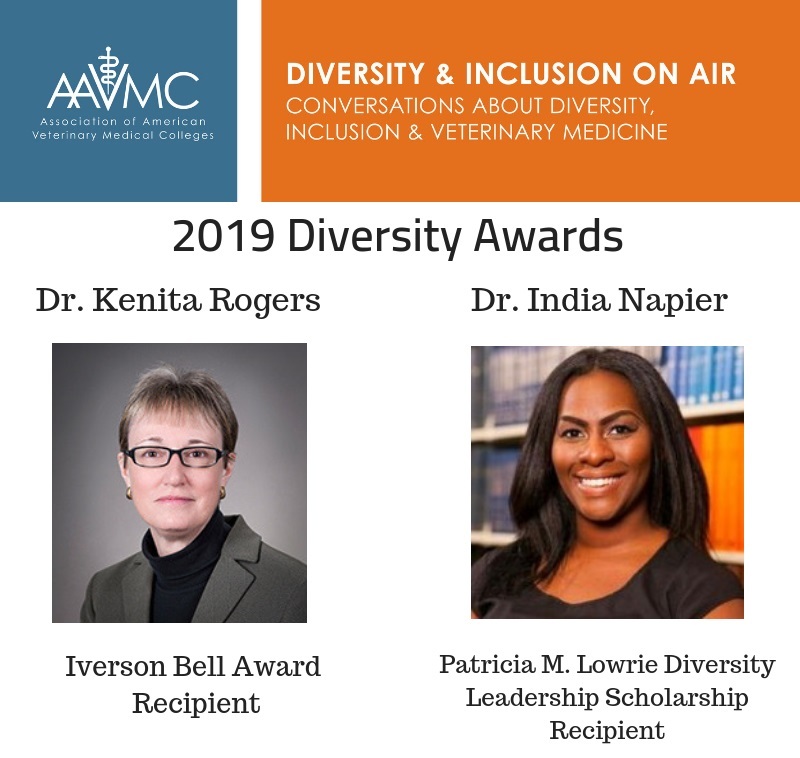 The 2019 AAVMC Annual Conference will also feature an Iverson Bell Symposium. As part of that biennial event, Dr. Kenita Rogers from Texas A&M University will be presented the Iverson Bell Award and India Napier from Tufts University will be presented the Patricia M. Lowrie Diversity Leadership Scholarship. The AAVMC’s Senior Director for Institutional Research and Diversity Dr. Lisa Greenhill conducted an interview with each for the AAVMC’s “Diversity & Inclusion on Air” program. Click here to hear the episode.
The 2019 AAVMC Annual Conference will also feature an Iverson Bell Symposium. As part of that biennial event, Dr. Kenita Rogers from Texas A&M University will be presented the Iverson Bell Award and India Napier from Tufts University will be presented the Patricia M. Lowrie Diversity Leadership Scholarship. The AAVMC’s Senior Director for Institutional Research and Diversity Dr. Lisa Greenhill conducted an interview with each for the AAVMC’s “Diversity & Inclusion on Air” program. Click here to hear the episode.Call for Volunteers: Council on Education Site Visitors 2019
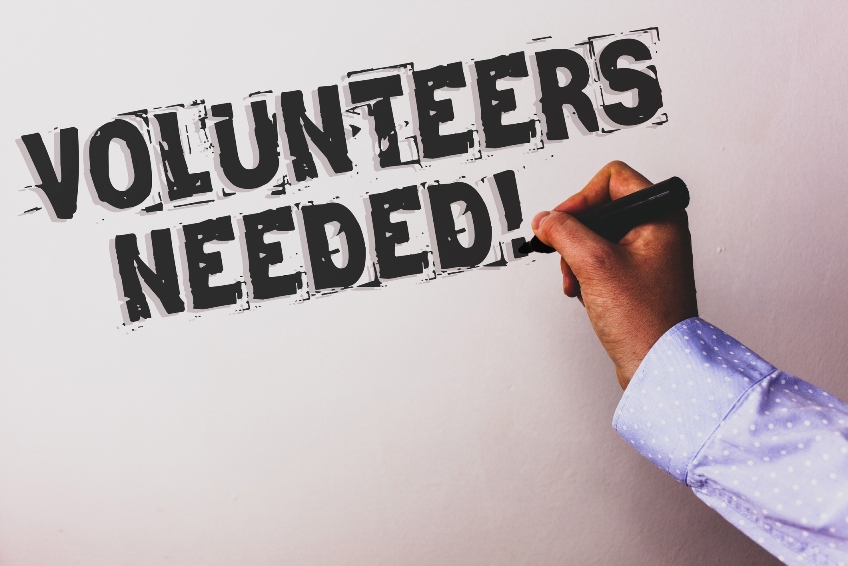 The AVMA Council on Education (COE) is now accepting applications for veterinarians interested in serving as Council on Education site visitors, according to AAVMC Senior Accreditation Advisor Dr. Sheila Allen. Applicants who are engaged in all areas of expertise are encouraged to apply.
The AVMA Council on Education (COE) is now accepting applications for veterinarians interested in serving as Council on Education site visitors, according to AAVMC Senior Accreditation Advisor Dr. Sheila Allen. Applicants who are engaged in all areas of expertise are encouraged to apply. Site visitors conduct veterinary medical college accreditation site visits on behalf of the COE, evaluate the self-study from the institution under review, verify the information during a comprehensive site visit, and submit a report to the COE.
The deadline for receipt of applications for site visitor candidates is March 15, 2019. For more detailed information and access to application materials, please click here.
A limited number of site visitors will be trained in 2019. All site visitors will receive training prior to participating in site visits and must be available for the 2019 training session, which will be held in Schaumburg, Illinois from Sept. 20-22, 2019.
For more information, email Dr. Allen at sallen@aavmc.org.
Deadline for AAVMC Institutional Advancement Awards March 31, 2019
 Fundraising and communications officers in AAVMC member institutions are reminded that the nomination period for two AAVMC Awards that recognize excellence in institutional advancement is drawing to a close. Deadline for the AAVMC’s two advancement awards is March 31, 2019. The AAVMC’s Communications Excellence Award, first presented in 2013, recognizes the important role communication plays in advancing academic veterinary medicine. The AAVMC Excellence in Scholarship Fundraising Award, which will be presented for the first time in 2019, is designed to inspire and recognize professional excellence and achievement in fundraising for DVM student scholarships. Each award includes a $1,000 honorarium and professional recognition. Click here and scroll down for more information. Award nominations/applications must be submitted electronically to awards@aavmc.org.
Fundraising and communications officers in AAVMC member institutions are reminded that the nomination period for two AAVMC Awards that recognize excellence in institutional advancement is drawing to a close. Deadline for the AAVMC’s two advancement awards is March 31, 2019. The AAVMC’s Communications Excellence Award, first presented in 2013, recognizes the important role communication plays in advancing academic veterinary medicine. The AAVMC Excellence in Scholarship Fundraising Award, which will be presented for the first time in 2019, is designed to inspire and recognize professional excellence and achievement in fundraising for DVM student scholarships. Each award includes a $1,000 honorarium and professional recognition. Click here and scroll down for more information. Award nominations/applications must be submitted electronically to awards@aavmc.org.AAVMC and VetCAN Virtual Career Fair Scheduled for March 31, 2019
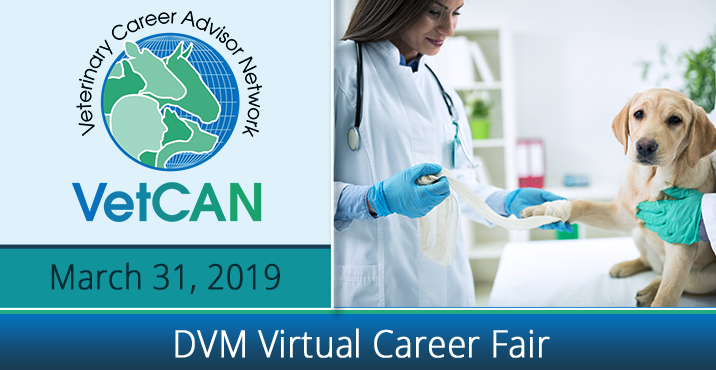 The Veterinary Career Advisor Network (VetCAN) will present a Virtual Career Fair on March 31, 2019.
The Veterinary Career Advisor Network (VetCAN) will present a Virtual Career Fair on March 31, 2019.The VetCAN Virtual Career Fair provides a forum for employers to identify top quality candidates and it provides job-seeking students and alumni from AAVMC member institutions with the ability to review job opportunities from their desktop or mobile device.
During the previous two VetCAN Virtual Fairs held in 2018, there were over 500 job seekers and 175 employers registered. For more information about how to participate in the March event, click here.
The Veterinary Career Advisor Network (VetCAN) is an AAVMC-affiliated organization founded in 2014 as a resource and network for career and professional development professionals working with veterinary students and alumni in AAVMC member institutions.
The group includes representatives from several AAVMC member institutions and welcomes career professionals who are working with students, alumni and prospective employers in veterinary medicine.
Their goal is to provide career development advising assistance for students, build and maintain relationships with employers, and help facilitate meaningful relationships between alumni and students.
Veterinary Entrepreneurship Academy Sparking Opportunities
 Disruptive technology, the information explosion and previously unimagined approaches to problem-solving and opportunity creation are changing the landscape.
Disruptive technology, the information explosion and previously unimagined approaches to problem-solving and opportunity creation are changing the landscape.Enter the Veterinary Entrepreneurship Academy, an emerging organization with roots at Texas A&M University that’s seeking to infuse the profession, from academia to the world of veterinary practice and beyond, with innovation. Essentially, the academy seeks to pair talented veterinary students with entrepreneurial start-up companies.
During a structured 10-week program mediated by VEA faculty, a veterinary student works closely with a start-up company innovating in the veterinary medical space. The students add value by providing knowledge and insight about the profession to the business; the business experience sparks innovation and entrepreneurial skills within the student.
The VEA is currently seeking to expand its portfolio of partnering schools and colleges of veterinary medicine. The program operates on a 1:1 funding model, with a sponsoring educational institution providing a stipend for the student, and the start-up company providing an equal amount of resources for facilities, faculty support and management of the course.
In addition to Texas A&M University, AAVMC member institutions that have participated in the past and/or committed to participate this year include Colorado State University, Cornell University, Lincoln Memorial University, Michigan State University, Oregon State University, Oklahoma State University, Ontario Veterinary College, Tufts University, University of California, Davis, University of Missouri and University of Tennessee.
The application period for the summer 2019 experience is over, however, VEA officials are interested in speaking with potential university partners for the future. Jeremy Kenny and Robert Trimble will make a presentation on the VEA during the upcoming 2019 AAVMC Assembly meeting on March 8.
For more information, contact Jeremy Kimble at jkenny@cvm.tamu.edu.
Barriers to Veterinary Medical Care Affecting Pet Owner’s Mental, Emotional Health
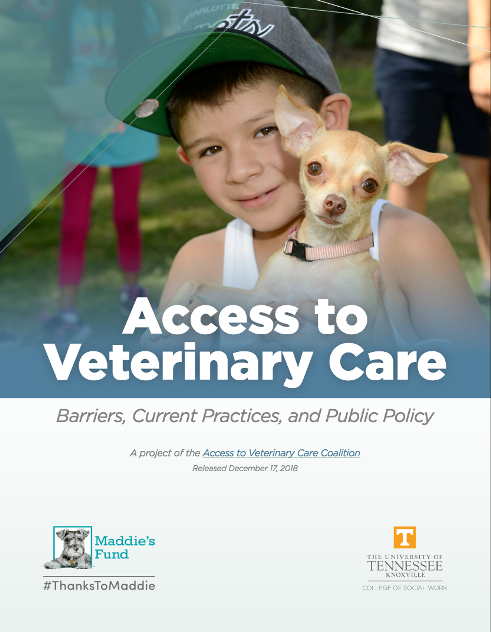 Pets bring joy, meaning and comfort to their owners and are an important part of family life. And when owners can’t provide needed veterinary medical services for their pets, it exerts a negative effect on their mental and emotional health. Over the past two years, almost 28% of pet-owning families experienced barriers to providing that care, most often because of a lack of financial resources. A recent report from the Access to Veterinary Care Coalition (AVCC) explores that dilemma. Supported by Maddie’s Fund, the AVCC is working with the University of Tennessee’s College of Social Work and the Veterinary Social Work program in the College of Veterinary Medicine.
Pets bring joy, meaning and comfort to their owners and are an important part of family life. And when owners can’t provide needed veterinary medical services for their pets, it exerts a negative effect on their mental and emotional health. Over the past two years, almost 28% of pet-owning families experienced barriers to providing that care, most often because of a lack of financial resources. A recent report from the Access to Veterinary Care Coalition (AVCC) explores that dilemma. Supported by Maddie’s Fund, the AVCC is working with the University of Tennessee’s College of Social Work and the Veterinary Social Work program in the College of Veterinary Medicine.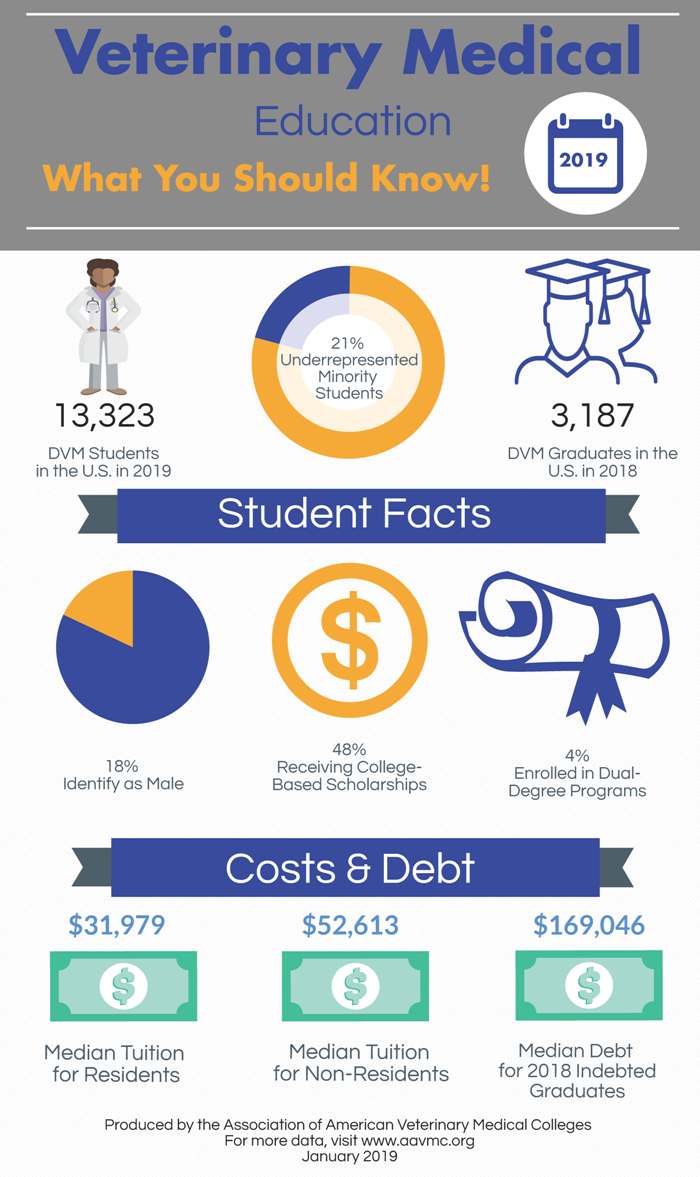
In the News
Could Shark DNA Help Fight Cancer in Humans?Popular Mechanics
Practice Without Prejudice
Today’s Veterinary Business
Auburn University Senior who Lost her Brother to Rare Genetic Disease is on a Mission for a Cure
Alabama News Center
Texas A&M Educator Wins National Veterinary Award
Quarter Horse News
Texas Tech Officials Make Case in Austin for Veterinary School, Other Priorities
Amarillo Globe News
Now in 24 States, ‘Zombie Deer’ Disease Could Spread to Humans
Before It’s News
Special Report: FAD Outbreak Could Cost U.S. Agriculture $200 Billion Over 10 Years
The Pig Site
UC Davis Vets Heal Bobcat’s Burns With Fish Skin
Good Day Sacramento
Pre-vet Students Petition Province
Brandon Sun
Suicides Among Veterinarians Become a Growing Problem
Washington Post
Researcher Confirms Transmittal of African Swine Fever by Feed
Agdaily
Researchers Predict Spread of Invasive Long-Horned Ticks
Bovine Veterinarian
Study: Endocrine-Disrupting Chemicals Linked to EMS in Horses
The Horse
Who’s Stronger? An Immunological Battle of the Sexes
Edge Media Network
Study Shows African Swine Fever Can be Transmitted Through Feed
Veterinary Practice News
Aggies to the Rescue
The Eagle
Research: Service Dogs Benefit Well-Being of Their Handlers
Indiana Ag Connection
New USask Treatment for Bone Cancer Which Hits Young People—and Dogs
Canada Free Press
$9M to Preempt Zoonotic Spillover Threats, Protect Military and Local Communities
Daily News
WCVM Teams up with Canadian Challenge for Unique Learning Experience
Education News Canada
A&M Chancellor Sharp said Tech Vet School is Not Needed
Midland Reporter Telegram
These Students Have Lots of Stories to Tell
Today’s Veterinary Business
New Disease Detection System Promises Faster and Cheaper Results for Vets
The Pig Site
From Our Members
Cornell Creates Multicollege Center for ImmunologyCornell University
LSU Vet School Awarded $11.5 Million for Pulmonary Research
Louisiana State
Veterinary Radiation Facility Opens at Iowa State
Iowa State
$9M to Preempt Zoonotic Spillover Threats, Protect Military and Local Communities
UC Davis
Cross-Species Cancer Comparison Uncovers New Drug Targets, Study Reveals
University of Guelph
CVM Service Dog Research Awarded $1.5 Million NIH Grant
NC State
Early Success Shown in Alternative Therapy for Equine Eye Disease
NC State
Texas A&M Researchers Prove Mammalian Joint Regeneration Possible
Texas A&M
New Biological Detection System Can Provide Faster, Less Expensive Results for Veterinarians Newswise
A&M Chancellor Sharp Said Tech Vet School is Not Needed
Midland Reporter Telegram
People in Motion
Xiaoping Zhu has been named Associate Dean of the Virginia-Maryland College of Veterinary Medicine’s College Park, Maryland, campus and chair of the Department of Veterinary Medicine at the University of Maryland.Kang Moon Seo has been named Dean at Seoul National University’s College of Veterinary Medicine. Je Yoel Cho has been named Associate Dean of Academic Affairs and So Yeong Lee has been named Associate Dean of Student Affairs.
“Like” us on Facebook or follow us on Twitter:




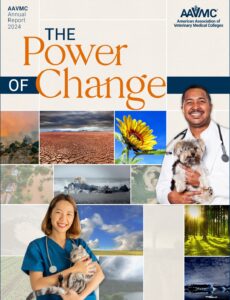
SHARE